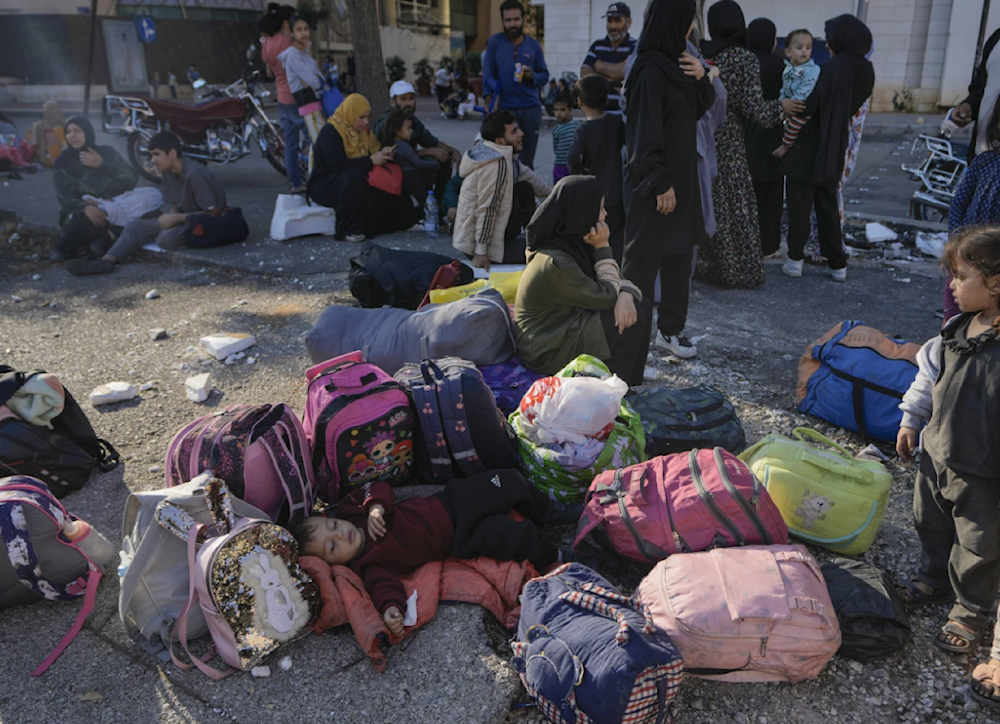Lebanon's children shelter in schools amid ongoing Israeli aggression
The war in Lebanon has killed nearly 2,000 people and forced close to a million others to abandon their homes.
-

Families gather in Martyr's square after fleeing the Israeli airstrikes in Beirut's southern suburbs on September 28, 2024. (AP)
As the Israeli aggression in Lebanon intensifies daily, many children are returning to their schools, not to learn their favorite subjects, but to shelter from Israeli airstrikes.
"I miss my friends and teachers," a 14-year-old Ali al-Akbar told AFP from inside a classroom-turned-shelter in Beirut's southern suburbs.
The war in Lebanon has killed nearly 2,000 people and forced close to a million others to abandon their homes.
An education ministry official informed AFP that Israeli attacks have forced around 40% of Lebanon's 1.2 million students to leave their homes.
Although the government postponed the school year to November 4, Ali's mother Batoul Arouni doubts it will be possible to begin by then, explaining that although she didn't wish her children missed school, "nowhere in Lebanon is safe anymore."
Chairs and tables have been moved back in the classroom to make place for thin foam mattresses, and tomatoes are sitting on a desk near the window. Charities have donated hot meals and water bottles in place of the normal books and pencils around the classroom.
AFP reported that in central Beirut, Salma Salman, 30, held her seven-year-old twin kids close to her, expressing that they had been in the streets for 2 weeks, adding "Who's thinking about sending their children to school with this war?"
Jennifer Moorehead of the Save the Children charity stated that the education system was "not going to recover this year," adding that it would be "generations before Lebanon will recover."
The school year in southern Lebanon has been delayed for over a year due to Israeli aggression on the country's south.
However, the interruption had not spread to other sections of the country until the latest aggression intensified.
Education Minister Abbas Halabi said his team was considering adjusting to current circumstances, such as mixing in-person and virtual learning.
However, in previous years, few could afford smartphones and frequent power outages disturb Internet connection and stability
Many displaced families said they couldn't bring computers or iPads as they fled.
73 healthcare workers killed; Lebanon facing a health crisis: WHO
The World Health Organization declared on Saturday that Lebanon is grappling with a severe health crisis, revealing that 73 health sector workers have lost their lives due to the ongoing Israeli attacks.
In a statement shared on its X platform, the organization highlighted the alarming toll, "Lebanon is facing a health crisis. There are 1,974 dead, 9,384 wounded, and 346,209 displaced."
#Lebanon 🇱🇧 is facing a health crisis
— WHO Regional Office for the Eastern Mediterranean (@WHOEMRO) October 4, 2024
🚨1,974 people killed
🚨9,384 people injured
🚨346,209 people displaced
🚨34 attacks on health care
🚨73 health workers killed
🚨67 health workers injured pic.twitter.com/1h2GECDRzI
The organization also pointed out that Israeli forces have conducted 34 attacks on healthcare facilities, resulting in the martyrdom of 73 health workers and injuries to 67 others.
Al Mayadeen's correspondent reported that the Israeli occupation targeted a center belonging to the Islamic Health Authority in the town of Siddiqin, located in southern Lebanon, earlier this morning.
On Friday, Israeli occupation forces fired artillery shells at the Salah Ghandour Hospital in the city of Bint Jbeil, southern Lebanon, resulting in casualties among healthcare workers Al Mayadeen's correspondent reported.
In detail, Red Cross emergency workers attempted to transfer the wounded from the hospital, however, Israeli occupation forces refused to guarantee the safety of ambulances. The decision to do so was communicated via the United Nations Interim Force In Lebanon (UNIFIL), which said that the Israeli military command said that the hospital was an "unsafe combat zone."
Nine of the 15 healthcare workers operating in the hospital were critically injured and Israeli occupation forces only okayed the transfer of five individuals to hospitals in Saida.
Medical workers evacuated their fallen co-workers using their cars and transferred the remaining casualties to the Tebnine Governmental Hospital, along with residents in the area.

 4 Min Read
4 Min Read








